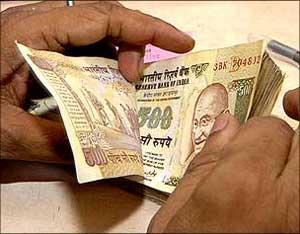 | « Back to article | Print this article |
T N Ninan on how the 'reformer' groups are milking the economy to serve their ends.
 Upamanyu Chatterjee's 10-year-old novel, The Mammaries of the Welfare State, had a memorable title that is worth recalling today when India's welfare state is finally being born. Cows have four udders, so it is useful to think of four groups at work on those udders -- reformers all of them.
Upamanyu Chatterjee's 10-year-old novel, The Mammaries of the Welfare State, had a memorable title that is worth recalling today when India's welfare state is finally being born. Cows have four udders, so it is useful to think of four groups at work on those udders -- reformers all of them.
First, there are the 'economic reformers' who have delivered an increase in the tax-GDP ratio. Left to work on the udders, they would like to spend the extra money on projects that would facilitate even faster economic growth, expand the size of the middle class, etc, but they are being pushed aside by the other, politically more powerful groups.
A second group, the 'civil society reformers', consists of those who look at the bottom of the pyramid, see the wretchedness on display there, and want ameliorative policies here and now, without necessarily focussing on how much the target group benefits from the largesse.
That brings us to the 'leaky pipe reformers' who want to reform the government system so that it delivers public services effectively and efficiently.
This, unfortunately, is a greater challenge than tinkering with tax rates and tariff levels, so they have decided that spending more money on every worthwhile objective is an alternative to real reform (as an economist-administrator argued, the only way to make sure that a leaky pipe delivers more water at the other end is to shove more water into the pipe!).
The fourth group (the 'Madhu Koda reformers') consists of those who want to milk those mammaries for themselves -- like the legislators in the Delhi assembly who want the flats in the Commonwealth Games Village to be given to them at subsidised rates.
This group includes those manning the sluice gates at all those leaks in the pipes, and also members of the middle class who howl at every attempt to cut (say) cooking gas subsidies -- although the census figures show that only 33.6 million out of 190 million households use cooking gas, while another 12.5 million use kerosene.
It is safe to assume that these are among the top 25 per cent of households in terms of income. The poorer households use firewood (100.8 million), crop residue (19.2 million), cowdung cake (18.4 million), and so on.
None of the really poor households get the subsidy that the cooking gas households get. But the middle class is busy at the mammaries, taking what it can get.
This is a useful framework with which to view contemporary events. The 'civil society' group is politically the most empowered, since it is led by Sonia Gandhi. So the government is getting ready to expand the definition of the poor, from the National Sample Survey's 27.5 per cent of the population, to the Tendulkar Committee's 37 per cent, although the Tendulkar panel used a definition of poverty (including access to things like healthcare and education) that had nothing to do with calorific intake --which is the basis for the NSS numbers.
This is not necessarily something to quarrel about, since about 35 per cent of the population is said to be severely malnourished -- provided most of the money reaches the intended beneficiaries.
We know, of course, that it does not, which is why the civil society reformers are also 'leaky pipe reformers'. This latter category includes the human resource development minister -- who has pushed through a law which disadvantages that part of the education system which delivers maximum bang for buck when it comes to education for the poor.
But everyone working on the udders is a 'reformer'; and so long as GDP growth is good and the udders have milk, who is to complain?